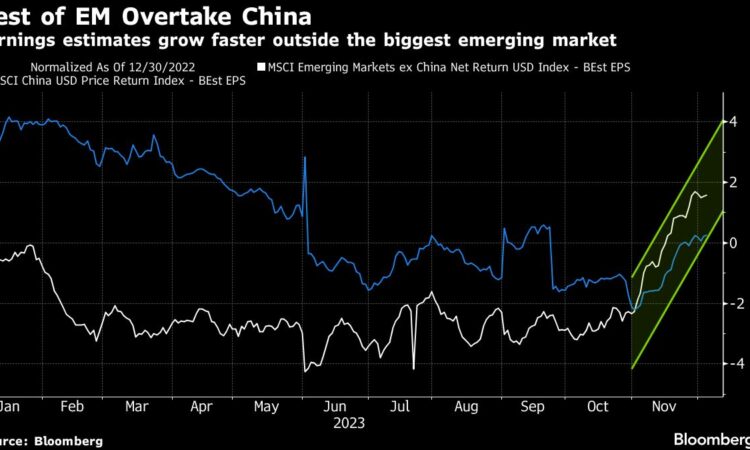
(Bloomberg) — Emerging market stocks declined Tuesday, led by Chinese companies that are now trading at their biggest discount to emerging-market peers in a quarter of a century.
Most Read from Bloomberg
Losses on equities in China, whose credit outlook was cut to negative by Moody’s Investors Service on Tuesday, have erased some $500 billion of shareholder wealth this year after major indexes tumbled as much as 16%. A gauge of developing-nation stocks excluding China, by contrast, has rallied 13%, adding about $2 trillion in market value.
The divergence, not seen since at least 1998, shows how the influence of the world’s second-biggest economy on developing-nation assets is waning as a slowdown in growth, debt overhang and property crisis drive away foreign participation. Investors are also concerned about geopolitical tensions and the risk of regulatory interventions by Chinese authorities.
Meanwhile, a buoyant US economy and expectations for interest-rate cuts by the Federal Reserve next year have been bolstering other developing nations in recent months, although key gauges maintained losses on Tuesday after a US report showed job openings fell to the lowest level since 2021 in October. Market concerns over slowing global growth pushed the MSCI emerging-market stocks index down 1% as of 11 a.m. in New York, and its currencies counterpart lower 0.3%. The MSCI China Index slid as much as 2.3%.
“Risk-takers across markets are desperate for the Fed to pivot next year towards a more dovish stance and start cutting interest rates,” said Juan Perez, director of trading at Monex USA. “Ahead of nonfarm payrolls on Friday, markets want signs that the labor market is being hurt.”
Also on Tuesday, Turkish lira bonds surged for a second day amid signs that foreign investors were returning to a market they’d long ago abandoned. Egyptian dollar bonds of varying maturities also surged, accounting for all 10 of the biggest gainers in emerging markets worldwide.
South Africa’s rand extended its declines, touching the day’s lows, after the US jobs data and a local report showed its economy contracted more than forecast. Across Latin America, currencies spiked on the US data, but quickly reversed the gains.
“Market is now adjusting to the possibility of a sooner and perhaps an increase in magnitude of rate cuts in the region,” said Luis Hurtado, a currency strategist at CIBC in Toronto
Here are five charts showing how China has been languishing behind other emerging markets:
Relative Performance
The MSCI China Index has tumbled 15% this year in both local-currency and dollar terms. Its underperformance, which began in October 2020, has taken the gauge to the lowest level since at least 1998 against the MSCI Emerging Markets Ex-China Index.
Index Weights
The underperformance has reduced China’s weight in the MSCI Emerging Markets Index to 25.5%, from more than 38% three years ago. China no longer dominates emerging markets the way the US commands the MSCI World Index of developed-market stocks, where it enjoys a 69% weight.
Earnings Estimates
The year began with analysts raising their earnings estimates for China while lowering them for the rest of emerging markets. That changed once expectations for a robust recovery in the world’s second-biggest economy were shown to be wrong. Smaller developing nations have not only erased that lag in earnings forecasts, but have also overtaken China.
Valuations
Investors are now willing to pay a 41% premium for stocks in emerging markets other than those from China. Based on forward price-earnings ratios, this valuation mark-up is the highest since the Federal Reserve started to hike interest rates in early 2022.
Market Capitalization
Benchmark indexes may show a roller-coaster performance for 2023, but individual developing nations have rallied handsomely, with at least 25 of them handing investors returns of 10% or more. The combined market capitalization of emerging markets continues to grow, while that of China is shrinking.
Most Read from Bloomberg Businessweek
©2023 Bloomberg L.P.



